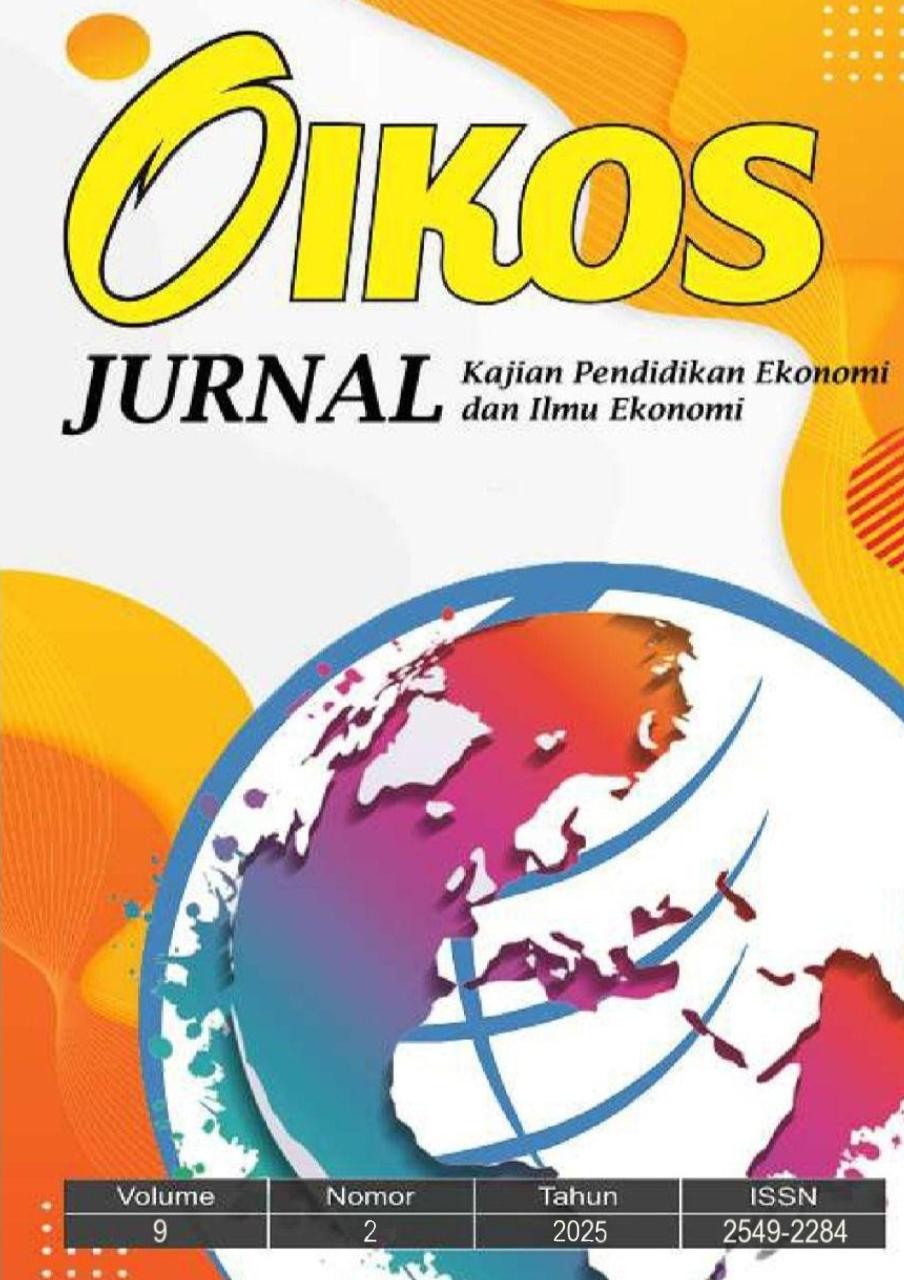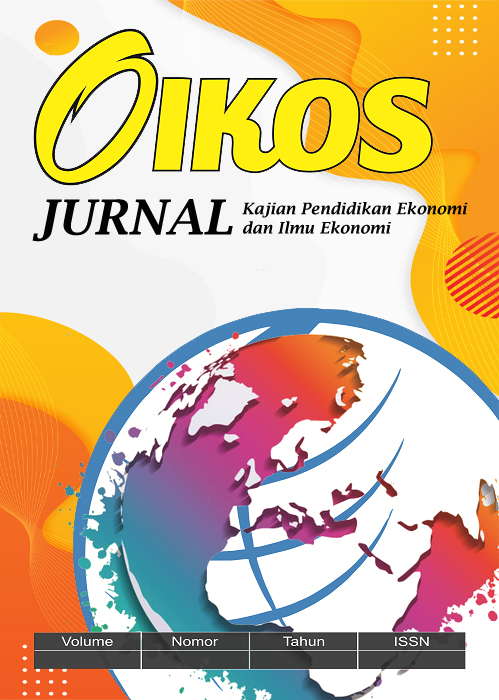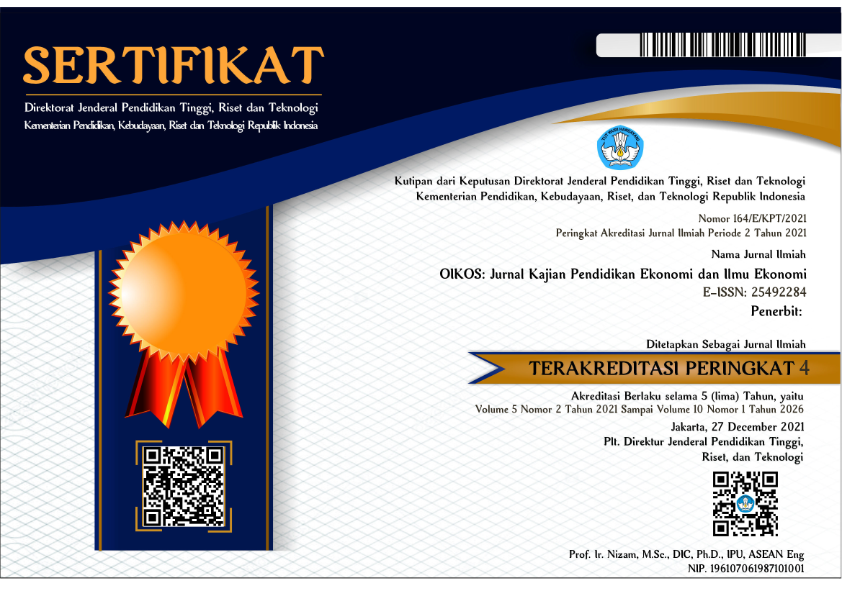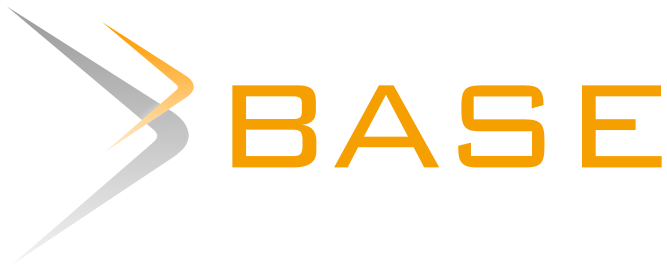SELF REGULATED LEARNING DAN LITERASI DIGITAL TERHADAP PRESTASI BELAJAR MAHASISWA PENDIDIKAN EKONOMI UNIVERSITAS SEBELAS MARET SURAKARTA APAKAH BERPENGARUH?
Keywords:
self regulated learning, digital literacy, learning achievementAbstract
This study aims to determine (1) the effect of self-regulated learning on the learning achievement of students of Economic Education at Sebelas Maret University, Surakarta, (2) the effect of digital literacy on the learning achievement of students of Economics at Sebelas Maret University, (3) the effect of self-regulated learning and digital literacy in a simultaneously on the learning achievement of students of economic education at Eleven March University. This research is a quantitative descriptive study with a population of 302 economics students from the 2020, 2021, and 2022 batches. The sampling technique used in this study was Proportional Random Sampling which resulted in 172 students. Data collection is carried out through questionnaires or questionnaires which are distributed via the Google form link. The data analysis used was multiple linear regression analysis with SPSS 25.The results shown from this study are: (1) First, self-regulated learning has a positive effect on the learning achievement of students of economic education at Sebelas Maret University, then (2) digital literacy has a positive and significant effect on the learning achievement of students of economic education at Sebelas Maret University, ( 3) self-regulated learning and digital literacy have a joint effect on the learning achievement of students of economic education at Sebelas Maret University.
Downloads
References
Susetyo. (2019). Inovasi Pembelajaran di Era Revolusi Industri 4.0: Prosiding Seminar Nasional PBSI UPY 2019. , 1-9.
Sugihartono, dkk. (2007). Psikologi Pendidikan. Yogyakarta: UNY Press.
Dimyati dan Mudjiono. (2009). Belajar dan Pembelajaran. Jakarta: PT Rineka Cipta.
Hamdani. (2011). Strategi Belajar Mengajar. Bandung: CV Pustaka Setia.
Spinath, B. (2012). Academic Achievement A2-Ramachandran, V. S InEncyclopedia of Human Behavior (pp. 1-8).
Ormrod, J. Ellis. (2008). Psikologi Pendidikan Membantu Siswa Tumbuh dan Berkembang. Jakarta: Erlangga.
Zimmerman, B. (2002). Becoming a Self Regulated Learner: an Overview. Theory Into Practice: 41 (1), 64-70.
Pintrich & de groot (1990). Motivational and Self-Regulated Learning Components of Classroom Academic Performance. Journal of Educational Psychology, 82 (1), 33-40.
Hidayati, K & Listyani, E (2010). Improving Instrument of Student’s Self-Regulated Learning.
Gilster. (1997). Digital Literacy. New York: Wiley
Bawden, D. (2001). Information and digital literacies: A review of concepts: Journal of Documentation, 57 (2) 218-259.
Li, L,. Peng, Z., Liucun L., Liao, H., & Li, H. Peer relationship, self efficacy, academic motivation, and mathematics achievement in zhuang adolesencnts: A moderated mediation model, 1-8
Naz, L., Raheem, A., Khan, F., & Muhammad, W. (2022). An Effect of Digital Literacy on The Academic Performance of University-Level Students: Journal of Positive School Psychology. 6 (8) 10720-10732.
Mark, J., & Michelle, A. (2022). Influence of Digital Literacy and Self-Directed Learning in the Obline Learning Succes of STEM College Students. International Journal of Humanities Social Sciences and Education, 9 (1), 88-100.
Siemens, G., & Jan, A. (2005). Connectivism: A learning theory for the digital age, International Journal of Instructional Technology and Distance learning. 1 (2), 1-9
Suhaini, A., Adnan, A., & Hawa Harith. 2020. Factors Influencing Student Achievement: A Systematic Review, 24 (5), 1475-7192.
Prayekti. (2018). The Influence of Cognitive Learning Style and Larning Independence on The students’ Learning Outcomes. Canadian Center of Science and Education.8 (2) 37-46
Manubey et al. (2022). Pengaruh Literasi Digital terhadap Hasil Belajar Mahasiswa. Jurnal Ilmu Pendidikan, 4 (3), 4288-4294.
Downloads
Published
Issue
Section
License
Copyright (c) 2025 OIKOS: Jurnal Kajian Pendidikan Ekonomi dan Ilmu Ekonomi

This work is licensed under a Creative Commons Attribution 4.0 International License.









